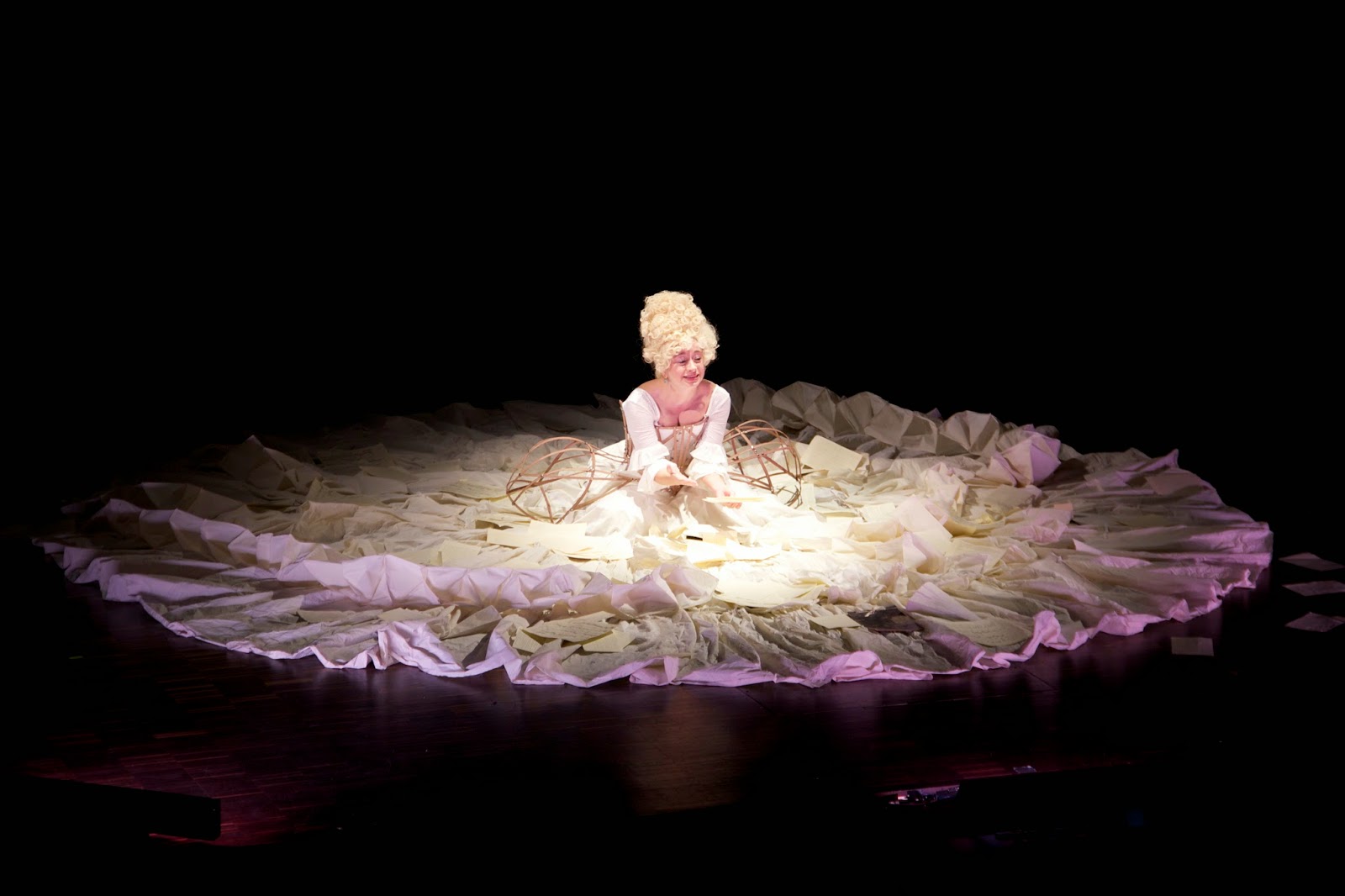Sylvia Milo in THE OTHER MOZART. Photo by Peter Griesser, DIVA Arts Collective. (Click to enlarge.)
After earlier productions at Piccolo Spoleto, the Cherry Lane Theatre, the Berkshire Fringe and the Mozarteum in Salzburg, this solo piece written and performed by Sylvia Milo is now at the HERE Theater in SoHo. The title character is Marianne Mozart, nicknamed Nannerl, older than her brother Wolfgang by almost 5 years, and also a musical prodigy. Nannerl was a superb harpsichordist and, during their childhood concerts together, she was originally the main attraction. That soon changed. Since there was no career path available to a woman musician, father Leopold shifted all of his attention to Wolfgang. As Nannerl reached marriageable age, her parents encouraged her to devote all her time to learning the household skills that would please her future husband. Her musical career faded away. She was prevented from marrying the man she loved (for reasons not made clear) and, at 32, was wed to a widowed baron with five children and forced to live as a provincial housefrau. For mysterious reasons, she gave her infant son to her father to raise during his first two years. She lived until the age of 78. Her gravestone is inscribed “sister of Wolfgang Amadeus Mozart.” Milo tells this story, mostly in chronological order. She is skillful in portraying Nannerl at the various stages of her life, less so portraying other family members. Much of the text comes from family letters she saved. She observes sadly that no one saved her letters. Milo captures the conflicting feelings of love, devotion, admiration, resentment and jealousy Nannerl felt for her brother. Throughout the piece, we are presented with many (perhaps too many) examples of how her gender prevented her from having a satisfying, creative life. The production is visually striking. We see Nannerl in her bloomers, with a lofty coiffure (by Courtney Bednarowski), standing on a white dress that covers almost the entire stage with a pannier (by Miodrag Guberinic) in its center. The dress (by Magdalena Dabrowska) is covered with letters and musical scores and has hidden pockets out of which Nannerl pulls such objects as a miniature keyboard and a teacup. The play has background music by Mozart (father and son), supplemented by original music by Nathan Davis and Phyllis Chen. It made for an interesting 75 minutes, although I was left wishing there had been more biographical explication and less repetitiveness about how Nannerl suffered for her gender. Isaac Byrne directed.
After earlier productions at Piccolo Spoleto, the Cherry Lane Theatre, the Berkshire Fringe and the Mozarteum in Salzburg, this solo piece written and performed by Sylvia Milo is now at the HERE Theater in SoHo. The title character is Marianne Mozart, nicknamed Nannerl, older than her brother Wolfgang by almost 5 years, and also a musical prodigy. Nannerl was a superb harpsichordist and, during their childhood concerts together, she was originally the main attraction. That soon changed. Since there was no career path available to a woman musician, father Leopold shifted all of his attention to Wolfgang. As Nannerl reached marriageable age, her parents encouraged her to devote all her time to learning the household skills that would please her future husband. Her musical career faded away. She was prevented from marrying the man she loved (for reasons not made clear) and, at 32, was wed to a widowed baron with five children and forced to live as a provincial housefrau. For mysterious reasons, she gave her infant son to her father to raise during his first two years. She lived until the age of 78. Her gravestone is inscribed “sister of Wolfgang Amadeus Mozart.” Milo tells this story, mostly in chronological order. She is skillful in portraying Nannerl at the various stages of her life, less so portraying other family members. Much of the text comes from family letters she saved. She observes sadly that no one saved her letters. Milo captures the conflicting feelings of love, devotion, admiration, resentment and jealousy Nannerl felt for her brother. Throughout the piece, we are presented with many (perhaps too many) examples of how her gender prevented her from having a satisfying, creative life. The production is visually striking. We see Nannerl in her bloomers, with a lofty coiffure (by Courtney Bednarowski), standing on a white dress that covers almost the entire stage with a pannier (by Miodrag Guberinic) in its center. The dress (by Magdalena Dabrowska) is covered with letters and musical scores and has hidden pockets out of which Nannerl pulls such objects as a miniature keyboard and a teacup. The play has background music by Mozart (father and son), supplemented by original music by Nathan Davis and Phyllis Chen. It made for an interesting 75 minutes, although I was left wishing there had been more biographical explication and less repetitiveness about how Nannerl suffered for her gender. Isaac Byrne directed.

No comments:
Post a Comment